Hanoi sets dual path through green and digital transformation
At an investment promotion and production programme held at the end of October, Nguyen Tran Quang, head of the Hanoi Centre for Investment, Trade, and Tourism Promotion, said the capital is making continuous efforts to become a city that is green, civilised, cultured, and modern.
“Hanoi strives for inclusive, fast, and sustainable development, primarily based on science, technology, innovation, green transformation, digital transformation, and the development of a circular economy,” Quang said.
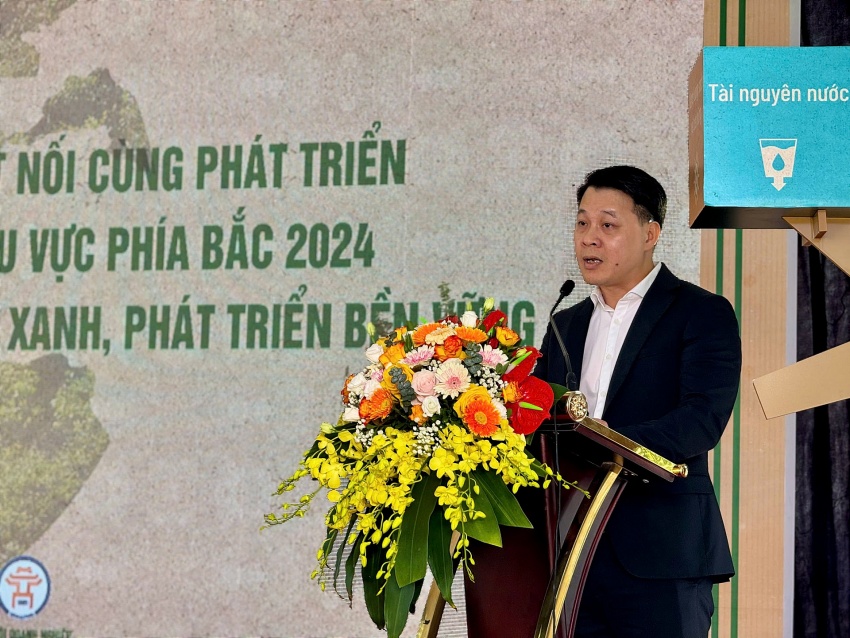 |
| Nguyen Tran Quang, head of the Hanoi Centre for Investment, Trade, and Tourism Promotion at an investment promotion and production programme held at the end of October. Photo: Nguyen Linh |
The city has identified priority sectors, including renewable energy, IT, safe food processing, and environmental protection.
Hanoi is also becoming an attractive destination for investors in the green industry sector with high technology and an environmentally sustainable development orientation. According to statistics from Hanoi’s Department of Planning and Investment, in just the first six months of 2024, 15 ventures in green production were licensed, with a total capital of over $2.5 billion.
On the digital transformation front, Hanoi aims to become a smart, modern city by 2030, gradually connecting with smart urban networks in the region and worldwide. And according to the latest data from Hanoi People’s Committee, the city has achieved many positive results in the process of digital transformation.
E-government has been widely implemented, with all eligible public services provided online at levels 3 and 4. This has streamlined access for residents and businesses, with over 2.5 million online transactions processed so far.
Fostering a digital society
Meanwhile, the city has successfully piloted electronic health records and criminal record certificates through the VNeID platform. Over 90 per cent of social welfare payments and pensions are now handled without cash, demonstrating the city’s commitment to digitalisation in everyday services.
The capital’s iHaNoi app, launched in mid-2024, is fast becoming a key channel for online interaction between the city government, residents, and businesses. By August, it had attracted more than 130,000 users from city officials and staff, with over 545,000 citizens engaging with the app. Public satisfaction with the app stood at 65.6 per cent, and over 3,200 suggestions have been submitted since its launch.
In terms of the digital economy, Hanoi is home to nearly 5,000 digital technology companies. E-commerce revenue has surged by 40 per cent compared to 2023, with more than 90 per cent of large enterprises in Hanoi adopting cashless payments. Meanwhile, 99 per cent of businesses now file and pay taxes electronically, significantly enhancing both management and business efficiency.
To foster a digital society, the city has established nearly 5,000 community digital transformation teams, comprising more than 30,000 members who help citizens adopt and experience digital services. More than 60 per cent of the working-age population has received basic digital skills training, providing a solid foundation for a new generation of smart digital citizens.
In healthcare, all health facilities have integrated their data systems with the city’s social insurance agency to ensure transparency in health insurance payments. In tourism, 27 locations have been digitised using 360-degree technology, boosting local tourism promotion efforts.
Hanoi’s green transformation goals are enshrined in various strategic documents, such as the approval in 2022 of developing the capital’s master plan towards 2030, and with a vision to 2050. In that, a balance between economic development and environmental sustainability is the key directive for the city’s planning.
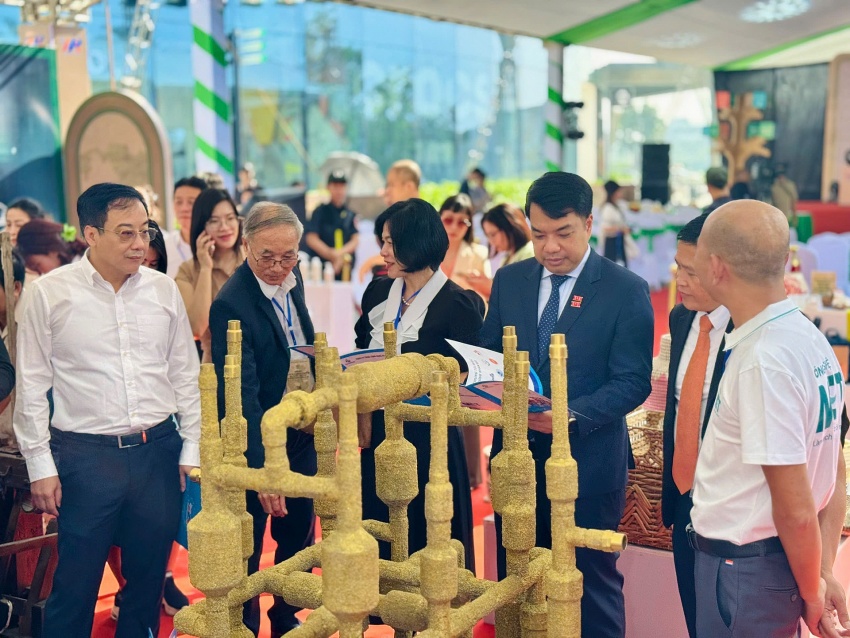 |
| Exhibition at the investment promotion and production programme held at the end of October. Photo: Nguyen Linh |
In agriculture, high-tech farming now accounts for 40 per cent of Hanoi’s total agricultural production value, according to the city’s Department of Agriculture and Rural Development.
At a workshop on digital transformation in quality management for agricultural products held in mid-October, Nguyen Dinh Hoa, deputy director of Hanoi Department of Agriculture and Rural Development, highlighted the capital’s commitment to modern, circular agriculture, connected to processing industries and adaptable to climate change.
“In recent years, the city has implemented various solutions, including IT, high-tech farming, and digital transformation, to boost productivity and sustainability in the sector,” Hoa said.
Notable achievements include the city’s 285 high-tech agricultural models, spanning cultivation, livestock, and aquaculture.
Paving the way for dual growth
In terms of attracting green, sustainable production enterprises, Hoa Lac High-Tech Park has become a focal point. The park aims to become a leading eco-innovation and smart technology city by 2030, with investment criteria focusing on low land use, low labour use, low emissions, and high technology, high investment rate, high automation, and high added value.
Hoa Lac High-Tech Park currently hosts 22 research and development (R&D) projects, 11 of which are already operational, covering IT, biotechnology, automation, and new materials. To date, more than 300 high-tech projects have been licensed, with total registered capital exceeding $8 billion.
Hanoi is planning the capital’s development towards 2030, adjusting the general plan until 2045, and drafting the revised Capital Law.
“Hanoi has determined the orientation of building the capital into a globally connected, civilised, modern city with green and smart development, while simultaneously promoting dual transformation, advancing the digital economy and circular economy,” said Ha Minh Hai, Deputy Chairman of Hanoi People’s Committee.
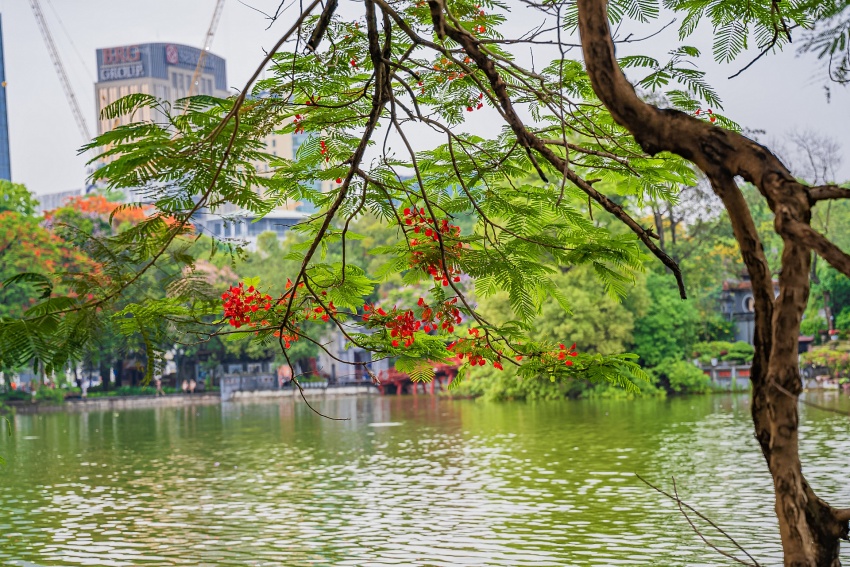 |
| Hanoi houses over 70 per cent of Vietnam’s sci-tech institutions and is home to 65 per cent of the country’s leading scientists |
According to Hanoi People’s Committee, Hanoi houses over 70 per cent of Vietnam’s sci-tech institutions, including universities, research institutes, and 82 per cent of the nation’s laboratories. The city is home to 65 per cent of the country’s leading scientists, positioning Hanoi as a prime location for innovation and scientific advancement.
The newly revised Capital Law, passed by the National Assembly, is expected to resolve many of the bottlenecks in science, technology, and innovation development. It includes provisions to support the application and transfer of technology, encourage businesses to invest in research and development, and commercialise scientific research.
One of the key innovations in the revised law is the introduction of a sandbox framework in certain fields, particularly new technologies, which will help Hanoi rapidly embrace technological advancements and stimulate startup growth.
Deputy Chairman of Hanoi People’s Committee Duong Duc Tuan said that the amended Capital Law also introduces important policies to promote green buildings, smart urban infrastructure, and the sustainable development of the capital.
Currently, Hanoi is developing legal documents to implement the 2024 Capital Law, with a particular focus on developing regulations and policies to promote the development of green cities, smart cities, and sustainable development. These regulations will create a legal foundation for the long-term development of the capital following a green, smart, and modern orientation.
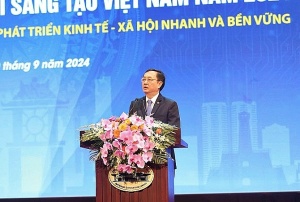 | Hanoi sets sights on becoming innovation hub Hanoi is not only Vietnam’s political and economic centre but also a leader in science, technology, and innovation, both nationally and regionally. |
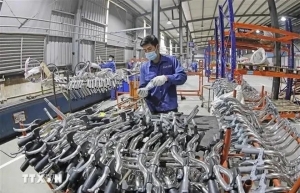 | Hanoi’s industrial production shows promising growth The capital city of Hanoi has seen thriving industrial production, especially in the processing and manufacturing sector, with local businesses working to seize opportunities to accelerate growth toward the year end. |
 | Hanoi International Film Festival to feature Vietnamese and international offerings The Hanoi International Film Festival, set for November 7-11, will showcase a selection of Vietnamese and international films, offering a platform for networking between filmmakers from both regions. |
What the stars mean:
★ Poor ★ ★ Promising ★★★ Good ★★★★ Very good ★★★★★ Exceptional
Related Contents
Latest News
More News
- Hermes joins Long Thanh cargo terminal development (February 04, 2026 | 15:59)
- SCG enhances production and distribution in Vietnam (February 04, 2026 | 08:00)
- UNIVACCO strengthens Asia expansion with Vietnam facility (February 03, 2026 | 08:00)
- Cai Mep Ha Port project wins approval with $1.95bn investment (February 02, 2026 | 16:17)
- Repositioning Vietnam in Asia’s manufacturing race (February 02, 2026 | 16:00)
- Manufacturing growth remains solid in early 2026 (February 02, 2026 | 15:28)
- Navigating venture capital trends across the continent (February 02, 2026 | 14:00)
- Motivations to achieve high growth (February 02, 2026 | 11:00)
- Capacity and regulations among British areas of expertise in IFCs (February 02, 2026 | 09:09)
- Transition underway in German investment across Vietnam (February 02, 2026 | 08:00)

 Tag:
Tag:




















 Mobile Version
Mobile Version